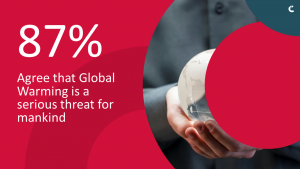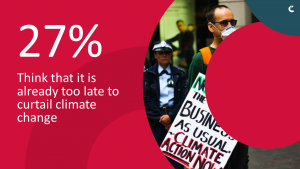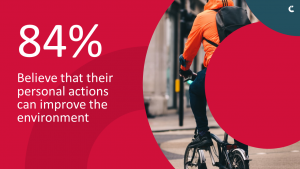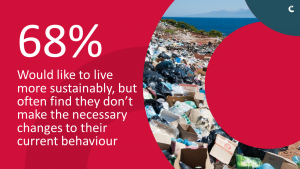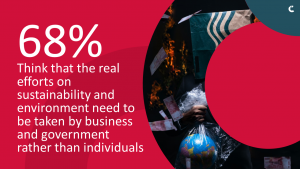Climate Change & Sustainability: Nearly 9 in 10 in Ireland agree global warming is serious threat for humankind
2021.06.05- Nearly 9 in 10 people in Ireland now agree that global warming is a serious threat for humankind.
- Five out of six people believe their personal actions can help to improve the environment.
- More than 1 in 4 think it is already too late to curtail climate change, with younger people being especially pessimistic.
- Nearly 7 in 10 people would like to live sustainably, but find they aren’t making changes to their behaviour.
- Nearly 7 in 10 people think that the real efforts on sustainability need to be taken by government and business, rather than individuals.
WIN International, the world’s leading association in market research and polling, has published the Annual WIN World Survey (WWS – 2020) exploring the views and beliefs of 29,252 individuals among citizens from 34 countries across the globe about technology. The survey analyzes views and opinions related to developing technology and its effects on people’s lives.
HEADLINES – IRELAND
Global warming – a serious threat to human kind?
- An overwhelming majority (60%) of people in Ireland totally agree that global warming is a serious threat to mankind, with a further 27% saying they agree somewhat.
- Some of the groups who are most concerned are people in higher SEGs (93%), the over 55s (93%) and people living in Dublin (92%).
- It is amongst some of these same groups – specifically 55+ ages and those in Dublin – where we see a significant rise in agreement from 2019 to 2020.
- Globally, some key nations have worsened in their perceptions of the threat, namely the United States (72%) and Germany (82%), respectively, while Ireland sits slightly higher (+2%) than the global average of 85%.
Too late to curtail the climate crisis?
- Over a quarter of people (27%) believe that it is already too late to curtail climate change, but positive that only 3% of people are totally sure of this. This suggests that only a very small proportion of the population have lost hope.
- The proportion of people who believe it is too late to curtail climate has declined significantly from last year across all groups (-11% overall). This suggests that people have gained some hope from reduced carbon emissions as a result of pandemic lockdowns.
- However, younger people are the most pessimistic about the possibility of fighting climate change, with a third of under-35s believing it is already too late, including 5% who are absolutely certain of this.
- Compared to other countries, people in Ireland are less pessimistic about the prospects of solving the climate crisis: globally, four in ten people (40%) believe that it is already too late.
Personal actions to help improve the environment
- Over 4 in 5 people (84%) believe their personal actions can make a difference in improving the environment, but only 30% totally agree.
- Women are significantly more likely (89%) to take this view, whereas men are less likely (79%). We also see significantly lower levels of agreement amongst under-35s (78%), suggesting again that younger people have a more fatalistic attitude towards solving the environmental crisis.
Wanting to change, but not making necessary changes
- More than two-thirds of people (68%) also say that they would like to live more sustainably, but often find they don’t make the necessary changes to their current behavior.
- This view is shared across all demographic groups, but positive that only 1 in 10 (12%) totally agree. This suggests that many want to live more sustainably and are in need of assistance in this area.
The responsibility of government and business
- While people in Ireland do want to play their part in solving the climate crisis, two-thirds of people still feel that the real efforts on sustainability and environment need to be taken by business and government rather than individuals.
- Younger people feel especially strongly that business and government must take the lead, with almost four in five (79%) agreeing with this, including a third (33%) of younger people who feel so strongly.
Sinead Mooney, Managing Director of RED C Research, said:
“Now that Covid is subsiding Irish people are once again focusing on climate change and the threat it poses to human existence. There is some sense that actions taken at an individual level are not sufficient and businesses and governments now need to take the lead in fighting climate change. People desire to live more sustainably but need assistance in making the sustainable choice easier, this is where business and government can help.”
HEADLINES WORLD
Climate change and sustainability
- Climate change has already been a reality for several years, and one of its main consequences is global warming, which is perceived as a threat to humanity by 85% of the global population surveyed (in APAC and Americas the share is even higher, with 87% of the population believing global warming is a threat).
- Vietnam (97%), South Korea (94%), Chile (93%), Indonesia (92%), India, Ecuador, and China (91%) are at the top of the world ranking when it comes to perceived threat of global warming.
- Interestingly, around 8 out of 10 people are convinced that their personal everyday actions could help improve the environment, a belief that seems more common among females (83%) than males (79%).
- On a global level, people in American region are even more strongly convinced about that (86%), followed by Europe (80%).
- In addition, 54% of the global population does not believe that it is too late to stop climate change, and the share has increased by 6% compared to 2019 (48%), meaning that more people are convinced there is still time to act against climate change.
- Among the most optimistic world regions, we find once again America (61%) and Europe (58%), where the vast majority of people believes that improvements are still possible for the benefit of our environment. People in APAC and MENA region seem to be less optimistic (47% each).
- Lately, sustainability has become a widely discussed topic since it involves many different sectors and activities and it is meant to improve the environment and the society we’re living in. When it comes to climate change, many discuss whether the sustainable actions should be taken by people or by governments and companies instead: 67% of the world’s population believes the real efforts in terms of sustainability need to be undertaken by companies and by governments rather than individuals only, with India (86%), South Korea (86%) and France (83%) being the countries where people agree most to this view.
- In line with the belief that personal actions can have an impact and that it is not too late to stop climate change, 66% of the global population affirms that they would like to live more sustainably, even if they find that often they don’t make the necessary changes in their own behaviors: people who are more keen in admitting that are mostly in the APAC region and America, indeed Paraguay (90%), South Korea (81%), the Philippines (77%), India (77%) and Chile (76%) are at the top of the ranking.
Vilma Scarpino, President of WIN International Association, said:
“The WIN Worldwide Survey still shows that the majority of the world population considers climate change as a serious threat to humankind, and 54% think that is not too late to curtail climate change. Citizens around the world are aware of their responsibility when it comes to applying sustainable behaviors in their everyday life but, at the same time, they expect businesses and governments to also do their part. Considering that many want to live more sustainably, governments and companies’ efforts towards sustainability could also be a driver to individuals’ behavioral change.”
-ENDS-
Media enquiries:
IRELAND DATA
Sinead Mooney, Managing Director, RED C Research
Derek Bell, Project Manager, RED C Research
+35318186316
WORLDWIDE DATA
Elena Crosilla, WIN Coordinator
+39 335.62.07.347
E-mail: [email protected]
NOTES FOR EDITORS
Methodology:
The survey was conducted in 34 countries using CAWI / online survey methods.
Sample Size and Mode of Field Work:
A total of 29,252 people were interviewed. See below for sample details. The fieldwork was conducted during October 21st and December 15th, 2020. The margin of error for the survey is between 4.4 and 2.5 at 95% confidence level.
The global average has been computed according to the covered adult population of the surveyed countries.
In Ireland, a representative sample of over 1000 adults were conducted online. Fieldwork was conducted in November 2020.
Download the reports below:
WIN World Survey – Climate Change & Sustainability – Press Release – June 2021
WIN World Survey – Climate Change & Sustainability – Irish Summary Results

